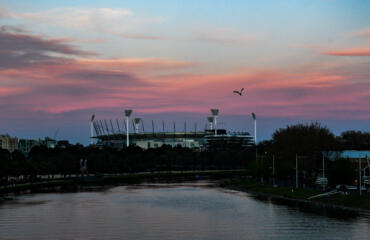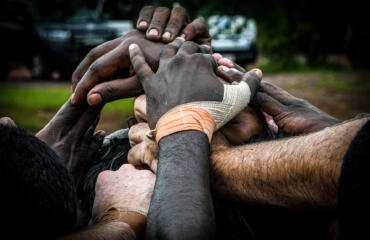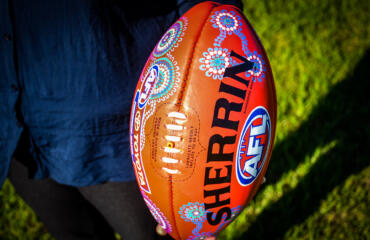On the northern wing of Parkville’s University Oval sits Chyloe Kurdas. She describes herself succinctly.
“I’m this five-foot lesbian from Turkish, Muslim, Catholic and Hungarian origins, who has influenced a really white, male code”.
That code is footy – Australia’s game.
Kurdas, 42, played for Melbourne University from 1999 until 2010, worked and coached for AFL Victoria as female development manager from 2007 until 2016, and oversaw the start of the AFL’s National Female Academy.
She’s one of the courageous women behind the push for a national women’s competition.
As I greet her, she explains that the bar near her house in Brunswick has decided that Thursday nights are perfect for karaoke. The result? Four hours sleep. But if she’s lacking energy, she doesn’t show it. When Kurdas talks, it’s a full-body effort – hands, head and mouth all working in top gear.
She displayed the same sort of energy on the oval in front us during her playing days. The ground is surrounded by yellow and red brick colleges, and an old white picket fence. The buildings of Melbourne’s CBD tower in the background, totally at odds with the skeleton of the old stand at the western end.
In one game on this pristine grass, Kurdas became so excited after a goal that she tore her calf while jumping to high-five teammate Michelle Dench. It wasn’t a small tear. She missed eight weeks of footy.
“The centre of the ground used to get boggy. At times, it was a quagmire. But for a little, five-foot inside mid with stumpy legs, it was a good place,” she says.
“It’s a beautiful deck for footy and for a cricket. I feel like I’m at home here. This is where I’ve felt the most comfortable in my whole life.”
Kurdas describes herself on one occasion as “peculiar”. On another, she says she’s “a bit of a weird cat”. She stopped drinking at sixteen. She’s a deep thinker. When she started her career, women playing footy was “uncool”. She played on. At MUWFC, she found her people.
“I feel like footy, in its innate DNA, is inclusive because to play the game you need tall, short, fat, skinny, fast and slow people. You need some outsiders. You need some insiders. It’s the nature of the game. It relies on diversity.”
Kurdas knows as well as anyone that footy hasn’t always been inclusive and diverse. She cites a passage from Geoffrey Blainey’s book, A Game of our Own.
“In 1896, these girls were talking about how much fun the boys were having, and saying ‘of course I want to play that’. It beggars belief that it’s taken over 100 years to get women playing professionally.”
She says it’s a blight on the Australian psyche.
“Our national psyche is built on two things – war and sport. Both are things that women have historically been excluded from. That’s impacted our culture and our community and how we socialise and how we position men and women.”
The fact she didn’t have anywhere to play staggered Kurdas as a young girl.
“It didn’t make sense to me. I was so capable. I was such a good athlete and I had so much to offer. My little five-year old brain couldn’t process it.”
She’s getting even more animated as she talks now, shifting in her seat and re-orientating her body with every word. “There were so many doors closed to me because I was female. To be female was to be deficient.”
I ask when she first remembers wanting to play. Her response is emphatic.
“I can’t remember a time when I didn’t want to play.”
I pass her my Sherrin and ask how it feels when she holds the ball. The feel of the leather brings up another memory as she starts to routinely spin it in in her hands.
One of her schoolmates, Jeff Roberts, was the kid next door who she played backyard sport with. Without him, she reflects, she would’ve been no good at footy.

Chyloe Kurdas (right) and Jeff Roberts with Doug Hawkins, 1985: Picture Melton Express
Roberts and Kurdas went to a clinic at Melton South Primary School, where they were coached by VFL/AFL stars Doug Hawkins and Dale “Flea” Weightman. Kurdas was the only girl there. The young pair made the local paper, photographed with the two champions.
Weightman, echoing Ron Barassi, told the kids to always have a footy in hand, to get familiar with handling it. Kurdas can handle a footy. She punches mine with her front two knuckles so it rotates exactly 360 degrees, leaving it in the perfect position to be punched again.
Footy also came to Kurdas through her Muslim father, Eddy, who used the game as a way of fitting in to Australian life when he immigrated from Turkey in 1969. He originally supported St Kilda, but converted to Richmond, realising they were stronger. Kurdas’ mother, Tarika, is Catholic, but there was never any pressure to adopt either faith.
“The great thing about faith in the Turkish culture is that it’s always been very private. It’s yours. There was never any pressure for me to be either. I always loved that about my family. You could be whoever you wanted to be. That probably translated into the aspirations I had to do things that weren’t traditionally female.”
The family is full of sports fans, but not of active participants. Kurdas has never seen her dad so much as break into a jog. Her grandmother, Joan, was her biggest sporting advocate, introducing her to the LBW rule.
“We’d watch TV and assess if it was there or not. She bought me one of those 99 cent plastic brown footballs from Coles New World (now Bunnings) on Sydney Road. They were terrible. One dog bite and the thing would just be flat. They wouldn’t bounce. Sounded like tin.”
The best athlete in the family was Kurdas’ grandfather on her mother’s side, Boldiszar, who was born in Hungary in 1925.
“He was a really promising soccer player, but he missed out on a lot of opportunities because of the depression and the war. He was conscripted into the Hungarian Army, and really, his dreams were taken from him.”
As Kurdas understands it, her grandfather spent a lot of the war going AWOL and trying to escape it. He eventually went home to his small town in Hungary and pulled down a communist flag, a dangerous act of defiance. The Soviets saw. They captured him and threw him in a gulag.
A group of English soldiers would come into the gulag and play soccer against the prisoners. They took a liking to him because of his skill with the ball. They decided to help him escape.
As he was getting onto the boat, he was shot, and had to be operated on while he was still on board. Kurdas remembers the huge scar on his stomach. The boat was bound for Canada and Australia. He chose Australia. His logic?
“Australia doesn’t a share a border with anyone. I’m going there,” Kurdas recounts.
He ended up in the mines in Wallaroo on South Australia’s Yorke Peninsula, but didn’t contact his family in Hungary until the end of the Cold War, out of fear he would land them in hot water. The reunion was 50 years in the making.
When her grandfather passed away in 2003, Kurdas took his ashes back to Hungary.
***

Picture: AFL Photos
Our conversation moves from family back to footy. I ask Kurdas if she’s disappointed that she never got the chance to play AFLW. The answer isn’t straightforward.
She loved being one of the first women to play on the MCG, on Mother’s Day in 2004. She loved playing in the famous blue and black guernsey of MUWFC. She liked that it was a proper VFL/AFL kit. University wore it during their time in the league in the early 1900s.
“My contribution to the game as a player – 158 games, seven Victorian sides, one All Australian side – that’s finite,” she says.
In those 158 games, Kurdas tore her anterior cruciate ligament three times. The first occasion, in 2001, led her into coaching. MUWFC were playing their first grand final. Ten minutes before half-time, her knee buckles. She reckons they were out of it anyway, but admits that her selfish reaction to the injury hindered the cause.
“I totally capitulated and made it all about me. Everyone was consoling me. I didn’t contribute to the second half, obviously. And I actually distracted them.”
Well-known women’s footy figure Lisa Hardeman asked Kurdas to assistant coach for her in 2002. People were still consoling her when the offer arrived.
“Then I just figured I’d do everything to make myself a part of the year. I had this really beautiful season of learning about how you can influence the scoreboard by investing in others and how rewarding it is. I found it more nourishing than actually playing myself. It really planted a seed.”
Melbourne University won their first flag in that 2002 season. The seed that had been sown led Kurdas into her role with AFL Victoria.
She recalls one of her favourite days watching women’s footy – a Melbourne and Bulldogs practise match in Craigieburn in 2016 – and in doing so, answers my original question.
“I was up there in my civvies. I took my AFL kit off. I just wanted to be Chyloe the person for a while.”
The passage of play she vividly describes starts with Norieul Kinross tapping the ball down to Maddy Keryk. Keryk handpasses it to Ellie Blackburn, who kicks it in the direction of Bianca Jakobsson. Hailey Wilde crumbs, then handballs to Danielle Hardiman.
The thread that links the six players is Chyloe Kurdas. She coached and mentored each of them.
“I had this beautiful moment of thinking, actually, I don’t even need to play because I’m playing through these girls. When you invest in others, your legacy is infinite. So no – I don’t think I do need to play AFLW.”
Kurdas has an academic background in psychology and loves developing and investing in people – not just in athletes.
“I had to offer something more than just the footy because I didn’t have a national competition to dangle when I started. I needed parents to bring their kids for something else. I wanted football to be a part of what they got, but also to have their whole person invested in. From the start, half our academy sessions were on-field and half of them were off-field, whether it was career-based stuff, or positive psychology, or public speaking experience,” she says.
“It was never just about AFLW for me.”
Is she proud? She says she’s wary of personal pride. It gets people too wrapped up in their own egos.
“I prefer to be pleased with things. But if I do feel pride, it’s that my life’s work has been something that has brought inherent joy to the lives of people that I’ll never know.”
Her work has been for every misfit woman that has had to find, or will have to find, the social courage to stand up, from those girls in 1896 to the five-year-olds of the future.
She talks reverently of Helen Lambert, and the other women who set up the Victorian Women’s Football League in 1981, knowing they would be derided.
“You can’t fully understand what you have to do to create change for the future if you don’t understand your history. It’s one thing I love about Indigenous culture. They acknowledge their elders and their history.”
Times have certainly changed since Kurdas’ early games, when the MUWFC girls weren’t allowed to play on the main oval. The changing facilities they had to endure at grounds like McAllister Oval were akin to horse stables.
She feels Australia’s national and sporting heritage will continue to change for the better.
“I see us rewriting the story of our national heritage in the future so that, from a sports perspective, that sporting influence on the national psyche is co-educational and gender balanced and has a strong feminine influence. And that doesn’t mean weak. It means love and care and support and gentleness.”
She says she does still grieve for the woman she might’ve become if Australia had changed sooner. Her voice softens while she says it, trembling ever so slightly.
“Maybe I’ve become more than anything I could’ve become because of the adversity. I’m still pretty happy with where I am. I’m not angry or anxious. There’s just a gentle sadness I carry.”
She counteracts that touch of sadness moments later with a slice of optimistic philosophy. She doesn’t seem the sort who stays sad for too long.
“I do think about all those random things that had to happen for that sperm to meet that egg and make each of us…” Her voice tails off for a moment. “We’re all walking miracles, really.”
About 15 minutes after we say our goodbyes, the phone rings. It’s Kurdas. She has an analogy for me.
“That grief … it’s like I lost an identical twin sister, and everything she might’ve become. But you just live with not knowing. You just live with that void. With that…space”
An edited version of this story is co-published in The Age.




